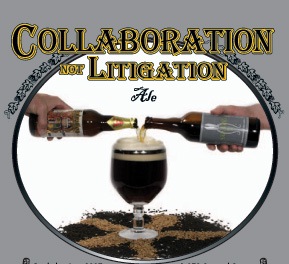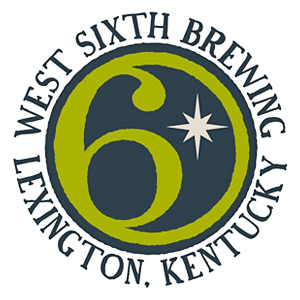 Way back in 2006, when Justin Timberlake was Bringing Sexy Back and we were first introduced to a lovable serial killer by the name of Dexter, Collaboration not Litigation was being brewed by Vinnie Cilurzo of Russian River Brewing and Adam Avery of Avery Brewing. This was after they both realized that they both had a beer named “Salvation” in their line-ups. Collaboration is literally a blend of both breweries Salvations (genius!). This is the kind of creative dispute resolution that we should expect to see in the craft beer community. However, in recent years, it’s become pretty obvious that not all turf tiffs are being resolved over a pint. As more breweries open, toes are bound to get stepped on. More and more, the collaborative spirit that is the backbone of the craft beer industry is slowly giving way to disputes that are playing out in cease and desist letters. Less and less are we all acting like adults, picking up phones and calling each other as opposed to calling Dewey, Cheatam, and Howe.
Way back in 2006, when Justin Timberlake was Bringing Sexy Back and we were first introduced to a lovable serial killer by the name of Dexter, Collaboration not Litigation was being brewed by Vinnie Cilurzo of Russian River Brewing and Adam Avery of Avery Brewing. This was after they both realized that they both had a beer named “Salvation” in their line-ups. Collaboration is literally a blend of both breweries Salvations (genius!). This is the kind of creative dispute resolution that we should expect to see in the craft beer community. However, in recent years, it’s become pretty obvious that not all turf tiffs are being resolved over a pint. As more breweries open, toes are bound to get stepped on. More and more, the collaborative spirit that is the backbone of the craft beer industry is slowly giving way to disputes that are playing out in cease and desist letters. Less and less are we all acting like adults, picking up phones and calling each other as opposed to calling Dewey, Cheatam, and Howe.
John Cochran, President and Co-Founder of Terrapin Beer Company, recently asked in his blog Trademarks – too many breweries and too few names, “how many ways can you play on the word hop”? It was a simple question that encompassed the issue of trademark infringement quite well, while simultaneously reducing the issue to the ridiculous. And it’s not just beer names. From Lost Coast to Left Coast to Left Hand, brewery names and logos are also under the microscope. So here’s a quick and completely incomplete timeline of the litigation of libations.
 2010 – Magic Hat v. Georgetown Brewing
2010 – Magic Hat v. Georgetown Brewing
After brewing a beer called 9LB Porter in honor of Seattle’s Georgetown neighborhood bar 9LB Hammer, Georgetown Brewing Founder Manny Chao was contacted by Alan Newman, the founder of Magic Hat. The brewery felt the new brew was too similar to their flagship beer, Magic Hat #9. Discussions on a compromise started well, with Georgetown agreeing to change the “9” to “NINE,” but came to an impasse when Magic Hat also demanded ownership of the name 9LB Porter. The implications of giving Magic Hat legal rights to the name were troublesome, considering that could bring future legal issues for 9LB Hammer. Inevitably, Manny’s decision was to rename the beer Georgetown Porter.
2011 – Marble Brewing v. Marble Brewing Company
Knoxville’s first brewery, Marble City Brewing Company, was getting ready to open when Co-Owners Adam Palmer and Jonathan Borsodi received some pretty bad news from Jeff Jinnett, the owner of Marble Brewery in Albuquerque, NM. Marble Brewery felt that the names were too similar, even though Adam and Jonathan had done their due diligence and Marble City Brewing Company was registered in 2010. In 2012, after fighting the lawsuit for a year and a half and nearly dissolving the company, Marble City Brewing Company was rebranded as Saw Works Brewing Company.
2012 – Steelhead Brewing Company v. Freetail Brewing
When Scott Metzger, founder of Freetail Brewing, received a cease and desist letter from the fine folks (nay legal team) at Steelhead Brewing over “Hopasaurus Rex,” we can only imagine that he thought it was a joke. Freetail Brewing doesn’t make a beer called Hopasaurus Rex. It’s not on a label or a T-shirt. Hopasaurus Rex is a nickname that they gave their inline hop filter and it was mentioned on their website. The ridiculousness was not lost on Scott, as is apparent in his response to Steelhead. Seriously, read it.
 2013 – Magic Hat (yes, again) v. West Sixth Brewing Company
2013 – Magic Hat (yes, again) v. West Sixth Brewing Company
Probably the most prominent of craft beer pissing matches was one over a logo and this one took place not only on legal stationary but also all over social media. Ben Self, co-founder of West Sixth Brewing, had been in conversations with the folks at Magic Hat for quite some time. West Sixth’s logo, it seemed, was too similar to the label on Magic Hat’s #9… if turned upside down of course. While West Sixth agreed to modify their logo, they did not feel like trademark rights to the number 9 should include the number 6 as well. After a stalemate and the good ol’ C&D letter, West Sixth took to social media and inadvertently caused a Facebook firestorm with their petition to ask Magic Hat to drop the lawsuit, garnering more than 17,000 signatures. In the end, the federal lawsuit was settled, the logo changed, and a “mea culpa” of sorts was issued by West Sixth.
2013 – Ska Brewing v. DuClaw Brewing
Ska Brewing has been making its Euphoria Pale Ale since 2005. DuClaw Brewing Company has been making Euphoria (Euforia) Brown Ale since 2006. After receiving a C&D letter from DuClaw, Ska smacked back with a petition from the US Patent and Trademark Office to revoke DuClaw Brewing’s rights to both the names Euphoria and Euforia, claiming earlier rights – and won.
2013 – SweetWater v. Lagunitas
First of all, if you are on Twitter and not following Lagunitas’ Tony Magee (@lagunitasT), you are seriously missing out on some funny and insightful stuff regarding this industry that we love. That being said, when Tony received a C&D letter from Atlanta-based SweetWater over the use of the term “420” (seriously…ponder that one for a minute), he took to Twitter and let everyone know how that really harshed his buzz. First of all, Lagunitas does not have a beer or brand with 420 in it. It will just appear on a label here or there, sometimes hidden, like the Playboy bunny, and pays homage to Magee’s love of the lifestyle. Time will tell if it appears again. Personally, I am really hoping it does brah.
Inevitably, we all must address that we live in a society where property rights matter. It’s also a litigious society fueled by lawyers who make a living defending those rights. And yes, some trademark disputes do necessarily end up in court – but I still don’t love it when they do. Diving headlong into these kinds of things is not without consequences. Actions on both sides can sometimes escalate wildly and unnecessarily endanger the sense of community that is so much a part of what makes the American craft beer industry special.
The bottom line is that, if ever there were an industry where disputes among peers should be able to be resolved over a couple of beers, it’s ours. We should keep that in mind.
 American Craft Beer The Best Craft Beer, Breweries, Bars, Brewpubs, Beer Stores, And Restaurants Serving Serious Beer.
American Craft Beer The Best Craft Beer, Breweries, Bars, Brewpubs, Beer Stores, And Restaurants Serving Serious Beer.
